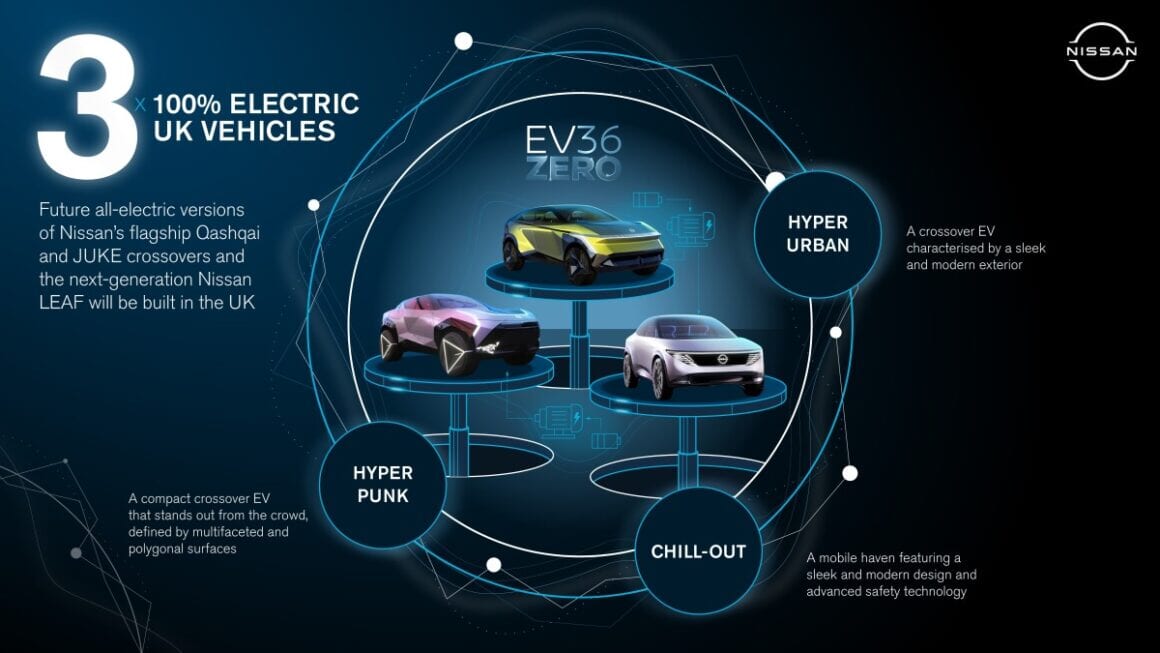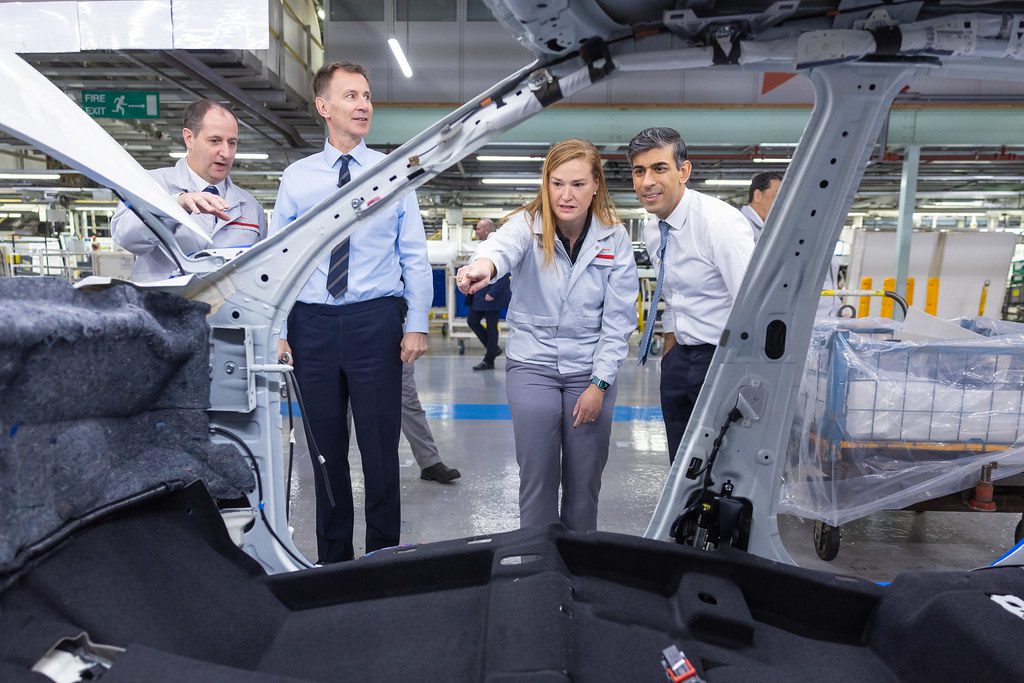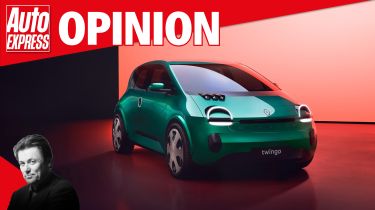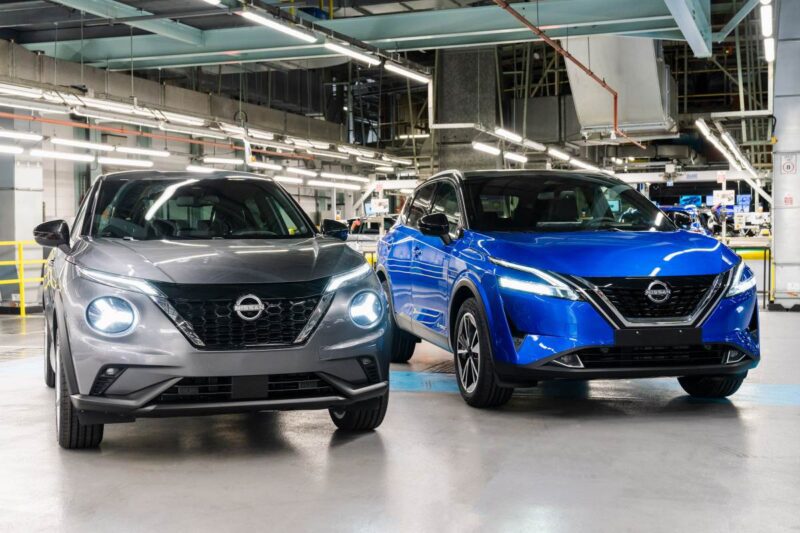UPDATE
UKNissan plans next-gen Leaf and two new electric models, including Qashqai
Japanese car giant Nissan – one of the pioneers of mass-produced EVs with the launch of the Leaf more than a decade ago – has revealed plans for a next-generation Leaf and two new electric vehicle models as part of a multi-billion investment in the UK.
The two new fully electric offerings include the a mid-sized electric SUV, an all-electric Nissan Qashqai and a slightly smaller model, the electric Nissan Juke.
Nissan plans to invest £3 billion ($A5.7 billion) in the creation of three new factories at its EV36Zero hub in Sunderland where it will produce the new models, as well as batteries and respective infrastructure.
It is one of the largest EV investment initiatives to date in the country. The Sunderland hub is powered by a renewables micro-grid based around locally produced wind and solar, including a new 20MW solar plant.

The Qashqai SUV was the UK’s best-selling car in 2022 and makes up one in every five cars built in the country. The smaller Juke has also sold in large numbers with over one million cars making it onto the road. Both of these of course are the ICE models which will be electrified as part of this investment.
All three electric initiatives will be based around concept models, two of which were recently unveiled at the Japan Mobility Show.
This included the Hyper Urban Concept, a crossover EV that will form the basis of the electric Qashqai, the Hyper Punk Concept, that will form the basis of the Juke, a compact crossover, and the Chill-Out Concept, which was first unveiled in 2021 and will form the basis of the renewed Leaf.
Further information about the three models, including names, specifications and launch dates, will be released at a later time.
The announcement, made late Friday in the UK, follows Nissan’s confirmation that all its new cars in Europe from now will be fully electric, and that it expects its passenger car line-up in Europe to be 100% electric by 2030.
“Exciting, electric vehicles are at the heart of our plans to achieve carbon neutrality,” Nissan president and CEO Makoto Uchida said. “With electric versions of our core European models on the way, we are accelerating towards a new era for Nissan, for industry and for our customers.”
Japanese car giant Nissan – one of the pioneers of mass-produced EVs with the launch of the Leaf more than a decade ago – has revealed plans for a next-generation Leaf and two new electric vehicle models as part of a multi-billion investment in the UK.
The two new fully electric offerings include the a mid-sized electric SUV, an all-electric Nissan Qashqai and a slightly smaller model, the electric Nissan Juke.
Nissan plans to invest £3 billion ($A5.7 billion) in the creation of three new factories at its EV36Zero hub in Sunderland where it will produce the new models, as well as batteries and respective infrastructure.
It is one of the largest EV investment initiatives to date in the country. The Sunderland hub is powered by a renewables micro-grid based around locally produced wind and solar, including a new 20MW solar plant.

NISSAN UK
The Qashqai SUV was the UK’s best-selling car in 2022 and makes up one in every five cars built in the country. The smaller Juke has also sold in large numbers with over one million cars making it onto the road. Both of these of course are the ICE models which will be electrified as part of this investment.
All three electric initiatives will be based around concept models, two of which were recently unveiled at the Japan Mobility Show.
This included the Hyper Urban Concept, a crossover EV that will form the basis of the electric Qashqai, the Hyper Punk Concept, that will form the basis of the Juke, a compact crossover, and the Chill-Out Concept, which was first unveiled in 2021 and will form the basis of the renewed Leaf.
Further information about the three models, including names, specifications and launch dates, will be released at a later time.
The announcement, made late Friday in the UK, follows Nissan’s confirmation that all its new cars in Europe from now will be fully electric, and that it expects its passenger car line-up in Europe to be 100% electric by 2030.
“Exciting, electric vehicles are at the heart of our plans to achieve carbon neutrality,” Nissan president and CEO Makoto Uchida said. “With electric versions of our core European models on the way, we are accelerating towards a new era for Nissan, for industry and for our customers.”

IMAGE; NISSAN UK
UK’s Prime Minister Rishi Sunak said Nissan’s investment is a massive vote of confidence in the UK’s automotive industry.
“This venture will no doubt secure Sunderland’s future as the UK’s Silicon Valley for electric vehicle innovation and manufacturing.”
UK’s Prime Minister Rishi Sunak said Nissan’s investment is a massive vote of confidence in the UK’s automotive industry.
“This venture will no doubt secure Sunderland’s future as the UK’s Silicon Valley for electric vehicle innovation and manufacturing.”
“Renault is taking over as the manufacturer of cars for the people”
Mike Rutherford thinks Renault is doing more than any other manufacturer when it comes to making affordable electric cars
by: Mike Rutherford
26 Nov 2023
2

Tuesday 7 November, 2023: the Government barks up the wrong tree by trying to answer the question that desperately few real-world motorists are asking. You know, the one about when inevitably expensive driverless cars we don’t want or need will be legal and insurable on UK roads, thereby putting countless hard-working, tax-paying professional drivers out of work and on the dole. Not clever.
A week later: the more clued-up, non-political ‘establishment’ did the opposite by asking – and to some extent answering – several of the more immediate concerns we have about the prices of, and future for, vehicles that run solely on electricity.

Cheapest electric cars on sale 2023
“EV demand in Europe to slow as customers await affordable electric cars,” warned the highly respected Reuters news agency. On the front page of the always- reliable Financial Times was the headline, “Electric car prices slashed after sales run out of juice.”
Even HSBC got in on the act by showing graphics clearly illustrating the current dramatic decline in the rates of EV sales growth across Europe and the United States. Of more immediate interest to buyers in Britain, the bank reckoned that average discounts on new electric cars in UK showrooms jumped from 6.5 per cent in August to 11.1 per cent last month.
The response from the Renault Group was instant and impeccably timed – or purely but deliciously coincidental. The Paris-based empire – led by Italian-born CEO Luca De Meo, ably assisted by his highly cost-effective factories in Eastern Europe, China and beyond – is well aware that the global EV industry’s business model (comprising generally excessive official retail prices resulting in sharply decelerating demand) ain’t working. Now there’s a surprise.
So the Group is now doing and saying more than any other large car maker about what’s broken. It already produces the least expensive pure EV in mainland Europe – the Dacia Spring. When it arrives in the UK in 2024, this urban runabout could start at under £20k.
And the good news continues after De Meo said last week that by 2026 he’ll bring back the Twingo – in pure-electric guise – below the psychologically important 20,000-Euro (£17,000) barrier. For those unable or unwilling to buy outright, the word is that this proper, small, pure-electric car will be available from as little as 100 Euros (£87) a month in some markets with incentives for EVs. By comparison, Citroen UK currently markets the Ami quadricycle from £99 a month (after a deposit of £1,337). Incidentally, Renault’s monthly figure of 100 Euros/£87 for the 2026 Twingo translates into precisely £20 a week.
Pay a bit more and you’ll get more from other imminent, temptingly priced, all-new Renaults, including the intriguing 4 and 5. Maybe a small Alpine or Dacia, or a product from the lesser-known Mobilize brand will be more up your street.
Regardless, at a time when Volkswagen has depressingly decided to ditch its entire entry-level up! range, Luca De Meo’s Renault Group is perfectly positioning itself to take over as the manufacturer of the car – or cars – for the people.
“EV demand in Europe to slow as customers await affordable electric cars,” warned the highly respected Reuters news agency. On the front page of the always- reliable Financial Times was the headline, “Electric car prices slashed after sales run out of juice.”
Even HSBC got in on the act by showing graphics clearly illustrating the current dramatic decline in the rates of EV sales growth across Europe and the United States. Of more immediate interest to buyers in Britain, the bank reckoned that average discounts on new electric cars in UK showrooms jumped from 6.5 per cent in August to 11.1 per cent last month.
The response from the Renault Group was instant and impeccably timed – or purely but deliciously coincidental. The Paris-based empire – led by Italian-born CEO Luca De Meo, ably assisted by his highly cost-effective factories in Eastern Europe, China and beyond – is well aware that the global EV industry’s business model (comprising generally excessive official retail prices resulting in sharply decelerating demand) ain’t working. Now there’s a surprise.
So the Group is now doing and saying more than any other large car maker about what’s broken. It already produces the least expensive pure EV in mainland Europe – the Dacia Spring. When it arrives in the UK in 2024, this urban runabout could start at under £20k.
And the good news continues after De Meo said last week that by 2026 he’ll bring back the Twingo – in pure-electric guise – below the psychologically important 20,000-Euro (£17,000) barrier. For those unable or unwilling to buy outright, the word is that this proper, small, pure-electric car will be available from as little as 100 Euros (£87) a month in some markets with incentives for EVs. By comparison, Citroen UK currently markets the Ami quadricycle from £99 a month (after a deposit of £1,337). Incidentally, Renault’s monthly figure of 100 Euros/£87 for the 2026 Twingo translates into precisely £20 a week.
Pay a bit more and you’ll get more from other imminent, temptingly priced, all-new Renaults, including the intriguing 4 and 5. Maybe a small Alpine or Dacia, or a product from the lesser-known Mobilize brand will be more up your street.
Regardless, at a time when Volkswagen has depressingly decided to ditch its entire entry-level up! range, Luca De Meo’s Renault Group is perfectly positioning itself to take over as the manufacturer of the car – or cars – for the people.

No comments:
Post a Comment